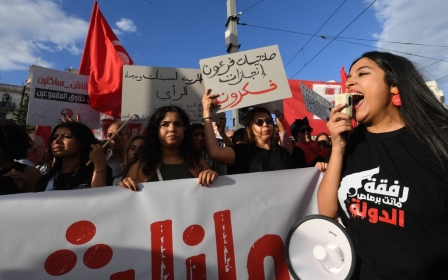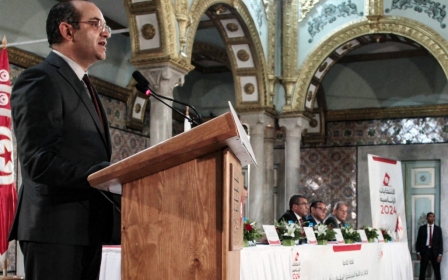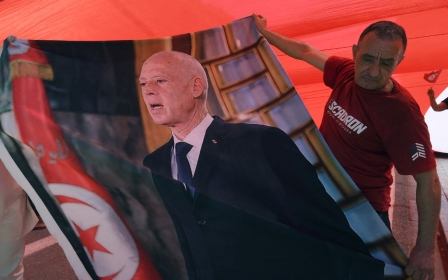Tunisia: Activists continue to defy Saied's autocratic turn despite risk of reprisals
As Tunisia is experiencing what many see as a return to autocracy under Kais Saied, a number of journalists and activists in the country and abroad continue to oppose the president's power grab and to actively advocate for a return to democracy, despite the daily risks of reprisals from a system that is increasingly less patient with its critics.
Saied, who was elected in October 2019 on a platform promising reform and transparency, dissolved parliament in July 2021 and seized wide-ranging power, marking a halt to the country's democratic transition after the 2011 revolution.
The move has been widely criticised as a constitutional coup, leading to widespread protests and condemnation both domestically and internationally.
Since then, the president has weakened the various intermediary bodies such as political parties and the judiciary, while cracking down on any opposition.
According to a tally marking three years after the coup compiled by Inkyfada, a local independent media outlet, at least 89 individuals have been summoned, interrogated, arrested or prosecuted under Saied. Among them are journalists, lawyers, activists, bloggers, union workers and members of political parties from all across the spectrum.
New MEE newsletter: Jerusalem Dispatch
Sign up to get the latest insights and analysis on Israel-Palestine, alongside Turkey Unpacked and other MEE newsletters
The clampdown accelerated after the introduction of Decree 54 in September 2022, which criminalised the publication of "false information" and has been criticised by human rights organisations as a severe infringement on press freedom.
Amnesty International has labelled the decree one of the harshest measures in over a decade aimed at stifling free expression.
The legislation has notably curbed the ability of independent media to operate freely. According to the Committee to Protect Journalists, at least 19 media professionals have been arrested or faced legal action under Decree 54.
In this context, independent media outlets have become rare, and all the more crucial in providing a counter-narrative to state-controlled media.
'Now, arbitrariness has returned: no one knows why or when they can be arrested'
- Thameur Mekki, journalist
Among these last free voices in Tunisia is Rachma (“a written sign” in Arabic), a political podcast launched last February by Thameur Mekki, an independent journalist based in Tunis who has been covering the situation in the country for the last decade.
"During the 2011-2021 period, political discussions were governed by the rule of law, and although this was not always respected, its legitimacy was largely recognised. Now, arbitrariness has returned: no one knows why or when they can be arrested," Mekki told Middle East Eye.
The journalist, who asked if Tunisia was “on the verge of a new dictatorship" in Rachma’s seventh episode, noted that while there are still some balanced programmes, particularly on the radio, the media landscape had largely reverted to state-controlled narratives.
"Public television has come back to state propaganda, building the image of the strong man [around the president]," Mekki said.
'Forcing journalists into self-censorship'
Since 2021, press freedom in Tunisia has collapsed, with the country dropping from 72nd out of 180 in Reporters Without Borders World Press Freedom Index to the rank of 118 in 2024.
The International Commission of Jurists, an international NGO, accused the Tunisian authorities of trying "to force journalists into self-censorship".
According to Mekki, the only few spaces for open discussions left today stem from individual initiatives and some journalists who are "still trying to do their job".
Political cartoonist Z is one of them: the cyber-activist, who used his drawings since the early 2000s to challenge the rule of long-time president Zine el-Abidine Ben Ali, perceives Saied's presidency as a return to authoritarian rule.
"When Saied became the sole figure in my drawings, it was clear we had reverted to dictatorship. Everything now revolves around him," Z told MEE.
رسام تونسي يرسم كاريكاتير ناقد للرئيس قيس سعيّد
— Rassd Tunisia (@Rassd_tn) September 14, 2024
"صلاحيات فرعون وإنجازات فكرون"
Crédit : DEBATunisie#Tunisie #Tunisia #تونس pic.twitter.com/DTvF8bhyzp
Translation: "Tunisian cartoonist draws critical caricature of President Kais Saied. 'The powers of Pharaoh and the achievements of Fakroun [turtle]'"
For the France-based cartoonist, the political and media landscape in Tunisia has drastically changed since the president’s coup.
"The diversity of actors we had in the post-revolution era is being replaced by simplified, smoothed news, which orbits around a central character, King Ubu," Z said, in reference to the renowned play by 19th century French writer Alfred Jarry which mocks an infantile and greedy king.
Z hopes his caricatures, published on his blog DebatTunisie ("Tunisia debate"), can make a difference either now or in the near future.
"It is impossible to predict the impact of art on the ongoing political events. History shows us that art as a whole accompanies political changes, and if it does not create them, it allows us to understand them. For example, the drawings I made under Ben Ali serve as a memory, documenting the end of dictatorship."
Z, who is followed by hundreds of thousands of Tunisians on social media, has become one of the symbols - through his outspoken artwork and commentary - of the freedoms people fought for during the revolution.
Organising the resistance
The Tunisian authorities have increased their crackdown ahead of the presidential election scheduled for 6 October, as illustrated by the recent arrest of more than 100 members of Tunisia's main opposition party, Ennahda.
Saied has been accused by several monitoring organisations, including Human Rights Watch, of prosecuting and excluding potential candidates in an attempt to secure his re-election.
This escalation has pushed some in the country to organise civic resistance.
Earlier this month, a new "Tunisian Network for the Defence of Rights and Freedoms" was created, currently bringing together around 20 NGOs and political parties, including the Tunisian League of Human Rights (LTDH), the Tunisian Forum for Economic and Social Rights, the Workers' Party, and the Democratic Current.
According to Mohieddine Lagha, LTDH secretary general, the network was established to "denounce the restrictions suffered by candidates and voters observed during this pre-election period" as well as ensure the "respect for the right to express oneself freely on public affairs".
As a first action, the new coalition organised a national march last Friday in the capital Tunis.
The network's call was heeded by more than a thousand Tunisians, who gathered in Habib Bourguiba Avenue to protest against Saied.
Hier, il y avait bien des milliers de personnes dans la manifestation de Tunis et pas quelques centaines, comme veulent nous le faire croire, les soutiens du régime de K Saïed.#Tunisie pic.twitter.com/sqKIOJCsXz
— Gargabil (@Gargabil) September 14, 2024
Translation: "Yesterday, there were thousands of people at the demonstration in Tunis and not a few hundred, as the supporters of the K Saied regime would have us believe."
During the march, the country's biggest in two years, activists chanted slogans such as "The power of a pharaoh and the achievements of a turtle", "No fear, no terror, streets belong to the people", as well as the iconic "Degage!" ("Out" in French), the call for resignation that ended Ben Ali's 23-year dictatorship in 2011 and sparked the so-called Arab Spring throughout the region.
Some observers saw the demonstration as proof of the enduring spirit of resistance among Tunisians, as well as Saied’s failure in his attempt to silence the streets.
However, according to political analyst Hatem Nafti, one should remain cautious about what this growing opposition can achieve.
'Resistance is increasing, which is encouraging, but the government’s propaganda is becoming stronger too'
- Hatem Nafti, political analyst
"Resistance is increasing, which is encouraging, but the government’s propaganda is becoming stronger too," Nafti told MEE.
While street protests reflect public discontent, exacerbated by increasing economic difficulties and high inflation rates, the government's control over media and public discourse significantly limits the effectiveness of this kind of action, Nafti added.
Besides, the negative impact of the clampdown on those trying to oppose Saied’s autocratic turn, both within Tunisia and abroad, is palpable.
Nafti, himself a prominent opponent of the president, said he has faced harassment and threats due to his outspoken criticism of Saied.
"I know that I am disturbing the government," Nafti, who lives in exile, told MEE. "Though there is no legal case against me, I’ve been informed by multiple sources that returning to Tunisia could result in imprisonment."
This context of repression, where dissenting voices are increasingly targeted, creates a pervasive climate of fear which could hamper any organised opposition aimed at restoring democracy in a way reminiscent of Tunisia's darkest hours.
Middle East Eye delivers independent and unrivalled coverage and analysis of the Middle East, North Africa and beyond. To learn more about republishing this content and the associated fees, please fill out this form. More about MEE can be found here.




